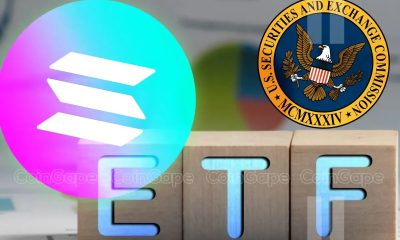Regulation
Custodia Bank Files Appeal Stating Fed’s Law Violation & Dual Banking System

Custodia Bank has filed an opening brief in the 10th Circuit Court of Appeals. They are challenging a Wyoming judge’s decision that granted the Federal ReserveFederal Reserve the power to deny it a master account. Moreover, the brief urges the appeals court to instruct the Wyoming district court to revoke its denial and grant Custodia a master account.
Custodia Bank Files Opening Brief In 10th Circuit
Custodia Bank CEO Caitlin Long has hired two veteran Supreme Court attorneys for the lawsuit against Fed. Their arguments are focused on several key points, including violation of the dual banking system. Custodia Bank’s lawyers argue that the Fed’s authority to deny master accounts to state-chartered banks undermines the dual banking system.
This system allows banks to choose between a state charter or a federal charter. Hence, they referenced the case Cantero v. Bank of America. The 10th circuit brief stated, “The United States maintains a dual system of banking, made up of parallel federal and state banking systems.”
In addition, Custodia’s lawyers also argue that the Fed’s power to discriminate against state-chartered banks may violate the Monetary Control Act (MCA). The MCA ensures fair access for state-chartered banks to the Fed’s services. In addition, they pointed to Congress’s mention of the word “shall” in the MCA, which states that “all Federal Reserve bank services…shall be available to non-member depository institutions.”
Furthermore, Custodia’s brief asserts that there is no basis for the Fed’s actions to be immune from judicial review. They argue that mandamus relief is available against the Federal Reserve Bank of Kansas City (FRBKC). Moreover, they state that the Administrative Procedure Act provides a remedy against the Board when it defies a congressional command.
In addition, the brief explains the historical significance of the dual banking system. It highlights that this system has survived for over 150 years and continues to be durable and responsive to the economy. Hence, the dual banking system respects distinct and equal state and federal roles.
Also Read: Custodia Bank CEO Predicts “Rip Roaring” Bitcoin Bull Market, Slams Warren Wing
Other Arguments Against Fed
Wyoming enacted a statute in 2019 to allow qualified applicants to obtain a Special Purpose Depository Institution (SPDI) charter, Custodia’s brief highlights. SPDIs take deposits, facilitate U.S. dollar payments, and provide digital asset custody services.
Moreover, they do not lend and must comply with all applicable federal laws. This is central to the Custodia Bank case because the Fed’s refusal to grant a master account to an eligible SPDI like Custodia is discriminatory.
Furthermore, the brief explains that the MCA was enacted to address payment access and unequal treatment of member and non-member banks. The MCA required the Fed to provide all depository institutions direct access to its payment system services on the same terms as member banks.
In addition, Custodia’s lawyers argue that Section 248a(c)(2) of the MCA sets forth a fee schedule for Fed services and requires these services to be available to nonmember depository institutions. The brief states, “All Federal Reserve bank services covered by the fee schedule shall be available to nonmember depository institutions.”
Also Read: Ripple Vs SEC News: Ripple President Clears the Air on Lawsuit and XRP ETF
The presented content may include the personal opinion of the author and is subject to market condition. Do your market research before investing in cryptocurrencies. The author or the publication does not hold any responsibility for your personal financial loss.
Regulation
USDC Issuer Circle Set To File IPO In April, Here’s All

USDC issuer Circle is reportedly set to file its initial public offering (IPO) in April as part of the firm’s plans to finally go public. The stablecoin issuer is allegedly already working with top financial institutions to achieve this move.
Circle To File IPO In Late April
According to a Fortune report, Circle is looking to file its IPO in late April, although the listing period remains uncertain. The report noted that when a company files to go public, its shares usually begin trading four weeks later, indicating that the listing could occur in May. However, there is also a scenario where the IPO process could drag on for months.
The stablecoin issuer is reportedly working with investment banks JPMorgan Chase and Citi to achieve its long-anticipated IPO. The firm had previously tried to go public in 2021 under a SPAC arrangement with a shell company.
The US SEC failed to sign off on this arrangement back then, and the company eventually scrapped these IPO plans by the end of 2022 when the crypto exchange FTX collapsed and the broader crypto market experienced a downturn.
Revelation about Circle’s IPO plans comes just days after the stablecoin issuer partnered with NYSE’s parent company to explore USDC’s use in traditional finance (TradFi). Meanwhile, the USDC stablecoin recently launched in Japan following approval from the country’s regulator. Notably, USDC is the first and only global dollar stablecoin approved under Japan’s stablecoin framework.
An Easier Path Now For The Stablecoin Issuer
Circle will likely face less resistance for its IPO plans under the current SEC administration. Under acting Chair Mark Uyeda, the Commission has shown its willingness to work hand in hand with crypto firms, which was missing under Gary Gensler’s administration.
US SEC Chair nominee Paul Atkins has also shown his willingness to change the approach that Gensler’s administration adopted towards crypto firms. During his nomination hearing, the SEC Chair nominee promised to prioritize providing regulatory clarity for the industry.
Circle’s IPO listing would be the biggest since the top crypto exchange Coinbase went public in 2021. Interestingly, Coinbase owns an equity stake in the crypto firm.
The firm’s USDC is currently the second-largest stablecoin by market cap, only behind Tether’s USDT. The stablecoin industry is heating up as more financial institutions look to develop their own stablecoin.
Donald Trump’s World Liberty Financial recently revealed plans to launch its USD1 stablecoin, while asset manager Fidelity is also considering doing so.
Disclaimer: The presented content may include the personal opinion of the author and is subject to market condition. Do your market research before investing in cryptocurrencies. The author or the publication does not hold any responsibility for your personal financial loss.
Regulation
Japan Set To Classify Cryptocurrencies As Financial Products, Here’s All

Cryptocurrency investors in Japan are bracing for impact following a plan to reclassify digital assets as financial products. While the plan has elicited excitement from cryptocurrency enthusiasts in the Far East, the ambitious plan will have to scale several legislative hurdles.
Japan Targets Reclassification Of Cryptocurrencies As Financial Products
According to a report by Nikkei, Japan’s Financial Services Agency (FSA) is inching toward classifying cryptocurrencies as financial products. Per the report, the FSA intends to achieve the reclassification via an amendment to the Financial Instruments and Exchange Act.
Currently, digital assets in Japan are considered crypto assets conferred with property rights and seen as payment means. Under the FSA’s plans, cryptocurrencies in Japan will be treated as financial products in the same manner as traditional financial products.
The FSA says it will adopt a slow and steady approach toward the reclassification, carrying out “a private expert study group” to test the waters. If everything goes according to plan, the FSA will submit the amended bill to Parliament in early 2026.
The classification of cryptocurrencies as financial products will have far-reaching consequences for the local ecosystem. Experts say treating cryptocurrencies as financial products will bring Japan closer to a crypto ETF launch amid a changing regulatory landscape.
Furthermore, the move may lower current cryptocurrency taxation for local investors since existing capital market rules will apply to the asset class.
A Fresh Bill For Crypto Insider Trading Is Underway
Apart from the reclassification, the FSA disclosed plans for new legislation against insider trading. The move flows treating cryptocurrencies as financial products and will strengthen existing investor protection rules.
“It is a direction to establish a new insider trading regulation that prohibits trading based on unpublished internal information,” said the FSA. “We will develop laws to prevent unfair transactions.”
However, Japan’s cryptocurrency scene is heating up to a boil, driven by local and international players. Last week, stablecoin issuer Circle secured approval from the FSA for USDC with top exchanges set to list the stablecoin.
Japan’s Metaplanet has tapped Eric Trump to join its Strategic Board of Advisors as it continues to load up Bitcoin.
Disclaimer: The presented content may include the personal opinion of the author and is subject to market condition. Do your market research before investing in cryptocurrencies. The author or the publication does not hold any responsibility for your personal financial loss.
Regulation
Kentucky Governor Signs Off On ‘Bitcoin Rights’ Bill, Strengthening Crypto Protections


In what is being dubbed a major development in the crypto regulation space, the Governor of the US state of Kentucky, Andy Beshear, has signed the ‘Bitcoin Rights’ bill into law. The law promises to safeguard protections for Bitcoin (BTC) users.
Bitcoin Rights Bill Comes Into Effect
Crypto regulations continue to evolve under pro-crypto US President Donald Trump’s administration. In the latest development, Kentucky has become the newest state to enshrine protections for digital asset users.
In an X post published on March 24, crypto advocacy group Satoshi Action Fund announced that Governor Beshear had signed the much-anticipated Bitcoin Rights bill into law. The post stated:
The right to self-custody, run a node, and use of digital assets is now protected for millions of Americans without fear of discrimination.
The bill was first introduced to the Kentucky House by Rep. Adam Bowling on February 19. According to the bill’s description, it seeks to safeguard users’ rights to use digital assets and self-custody wallets. Additionally, it aims to prohibit local zoning changes that discriminate against crypto mining operations.
The legislation outlines guidelines for running a digital asset node and excludes digital asset mining from money transmitter license requirements. It also clarifies that crypto mining or staking is not considered an offer or sale of securities.
On February 28, the bill passed Kentucky’s House of Representatives with a unanimous vote of all 91 representatives in favor. It later passed the Kentucky Senate on March 13, receiving backing from all 37 senators.
Kentucky’s proactive stance toward cryptocurrencies isn’t new. Earlier this year, the state became the 16th US state to introduce legislation seeking to create a Bitcoin strategic reserve.
Meanwhile, neighboring state Arizona is also joining the crypto movement. A recent X post by Bitcoin Laws revealed that Arizona’s House Rules Committee has passed two Bitcoin reserve bills — SB1373 and SB1025. These bills will now head to a full floor vote.
Renewed Optimism Under Trump Administration
Following Trump’s victory in the November presidential election, cryptocurrency regulations in the US are evolving rapidly, with many states introducing legislation aimed at strengthening their digital asset ecosystems and attracting crypto businesses.
Positive changes in crypto regulations are encouraging industry businesses to expand. For instance, leading crypto trading platform Coinbase recently announced plans to hire 1,000 employees in the US.
The Trump administration has also witnessed several lawsuits being dropped against major crypto entities, including Kraken, Coinbase, Gemini, and others. At press time, Bitcoin trades at $87,399, down 0.2% in the past 24 hours.

Featured Image from Unsplash.com, chart from TradingView.com

Editorial Process for bitcoinist is centered on delivering thoroughly researched, accurate, and unbiased content. We uphold strict sourcing standards, and each page undergoes diligent review by our team of top technology experts and seasoned editors. This process ensures the integrity, relevance, and value of our content for our readers.
-

 Market22 hours ago
Market22 hours agoCFTC’s Crypto Market Overhaul Under New Chair Brian Quintenz
-

 Market19 hours ago
Market19 hours agoBitcoin Price Battles Key Hurdles—Is a Breakout Still Possible?
-

 Market24 hours ago
Market24 hours agoEthereum Price Faces a Tough Test—Can It Clear the Hurdle?
-

 Ethereum22 hours ago
Ethereum22 hours ago$2,300 Emerges As The Most Crucial Resistance
-

 Altcoin14 hours ago
Altcoin14 hours agoWill XRP, SOL, ADA Make the List?
-

 Altcoin21 hours ago
Altcoin21 hours agoA Make or Break Situation As Ripple Crypto Flirts Around $2
-

 Market21 hours ago
Market21 hours agoXRP Bulls Fight Back—Is a Major Move Coming?
-

 Market20 hours ago
Market20 hours agoIs CZ’s April Fool’s Joke a Crypto Reality or Just Fun?























✓ Share: